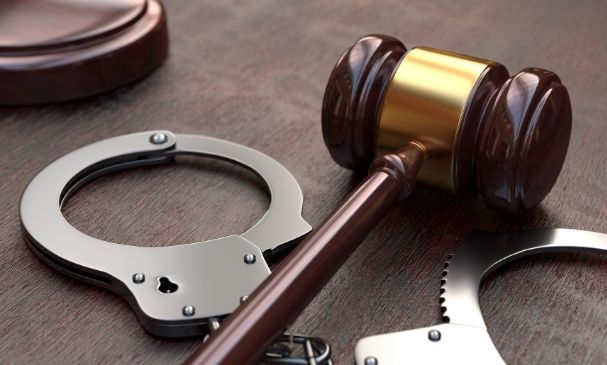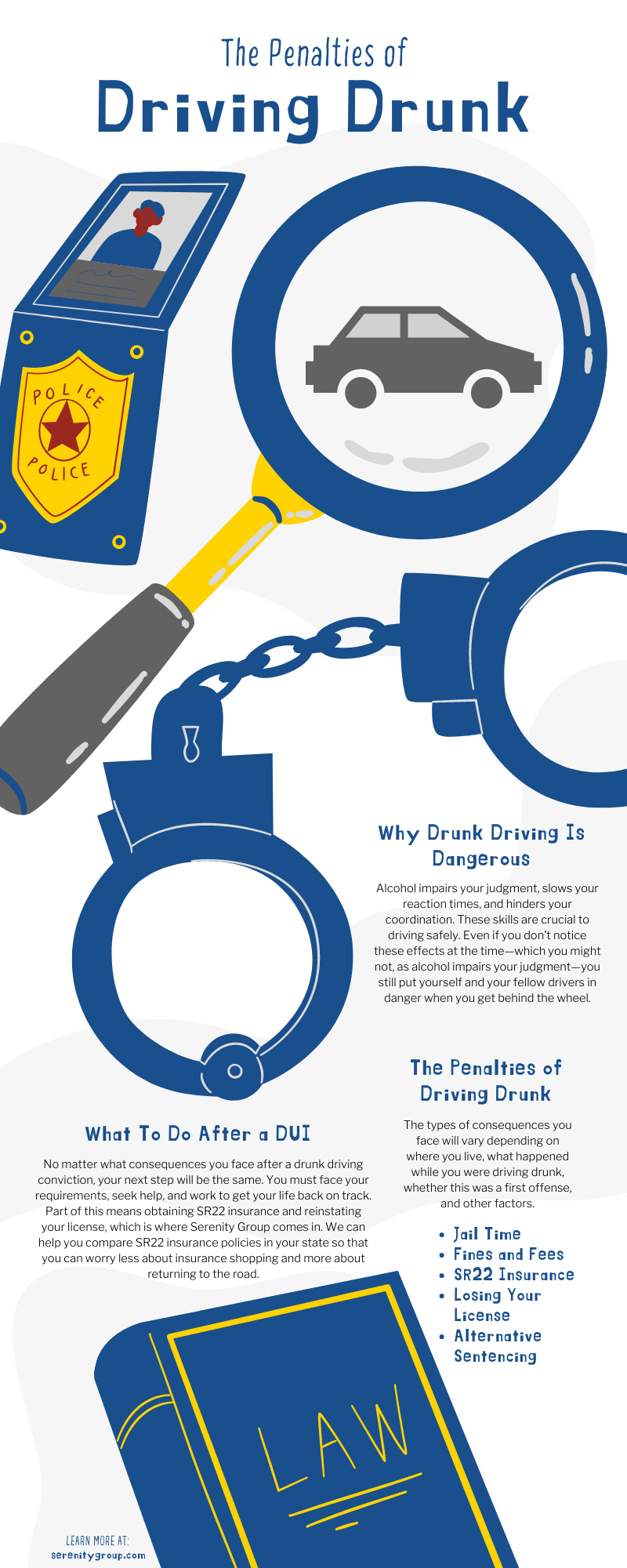The Penalties of Driving Drunk

Driving while intoxicated is a serious crime, and there are serious consequences that go with it. Like many laws, the penalties of driving drunk change from state to state. However, the idea remains the same across the board—drunk drivers are a danger to themselves and others, and they must improve before they can return to the road. That’s why states suspend or revoke your license after a DUI conviction. It’s also why drunk drivers face strict consequences such as jail time, steep fines, or time served in alcohol education or addiction programs. Every case is different, but it’s still important to learn the potential consequences of a drunk driving incident. Learn more about what a DUI conviction might entail with this rundown of the various punishments for drunk driving.
Why Drunk Driving Is Dangerous
Before you learn more about the different consequences of driving drunk, it’s important to understand why these laws exist. While everyone knows that drunk driving is illegal, many people don’t think seriously about the dangers behind the act. That’s why many drivers think they’re still okay to drive if they only have a couple drinks. However, when you fully understand the ways alcohol affects the body, you’re more likely to make smart choices when you drink. Alcohol impairs your judgment, slows your reaction times, and hinders your coordination. These skills are crucial to driving safely. If you’re intoxicated behind the wheel, you might not react to an upcoming red light until it’s too late to stop. Alcohol can also affect your vision or make you dizzy, making it easy to swerve between lanes without realizing it. These are just a couple examples of how alcohol inhibits your ability to drive. Even if you don’t notice these effects at the time—which you might not, as alcohol impairs your judgment—you still put yourself and your fellow drivers in danger when you get behind the wheel.
The Penalties of Driving Drunk
DUI laws exist to discourage drunk drivers from getting behind the wheel and keep everyone safe. The types of consequences you face will vary depending on where you live, what happened while you were driving drunk, whether this was a first offense, and other factors. If an officer arrests you for drunk driving, you won’t know the specifics of your punishment until that arrest turns into a conviction. However, you can research your state laws regarding the following consequences to gain a better idea of what you might face.
Jail Time
The amount of jail time you might face for a DUI varies from case to case. Most states classify a first-offense DUI or DWI as a misdemeanor. This usually means you’ll face a maximum of anywhere from six months to a year. Some states have even shorter sentences for first-time DUIs. However, multiple offenses can make that sentence longer. You will also spend more time in jail if your drunk driving led to an accident. Property damage or bodily injury can turn a misdemeanor into a felony, which means a longer sentence. Depending on where you live, you might spend several years in jail after a felony DUI.
Fines and Fees
Like jail time, the legal fees you face after a DUI conviction will change depending on the circumstances of your case. First-time offenses and other misdemeanors will have smaller fees than more severe convictions. Most state fines range from $500 to $2000 for a first offense DUI. However, some states have fines as low as $100 or as high as over $6000 for a first offense. These fines aren’t the only financial consequences you’ll face. A DUI can also lead to costly court fees and a higher auto insurance premium.
SR22 Insurance
Most states require drunk drivers and other high-risk drivers to obtain SR22 insurance before reinstating their license after a conviction. The SR22 proves to the state that you are meeting and maintaining the minimum liability requirements for your auto insurance. If you face an SR22 requirement after a drunk driving incident, you will have to obtain a new policy through one of the insurance companies that offer SR22 insurance. This is usually a requirement for reinstating your driver’s license after a suspension or revocation. Your SR22 policy can last anywhere from one to five years, so make sure you read up on your requirements and maintain the policy for its entire duration.
Losing Your License
Losing your license is another serious consequence that can result from drunk driving. License suspensions can last anywhere from a few months to a few years. During this time, you will be legally unable to drive. Some states might even confiscate your car or cancel your registration to further ensure you stay off the road. This can prove to be much more than an annoying hassle. The inability to drive makes it harder to get to school, work, and other appointments. While some states will grant a restricted license that allows you to drive to and from school or work, it’s still difficult to go about many daily tasks with no license.
Alternative Sentencing
Some states respond to DUI cases with alternative sentencing options. These penalties focus on education and rehabilitation instead of jail time or steep fines. Many judges who recommend alternative sentences will do so for first offenders or other milder cases. These sentencing options include alcohol or addiction education courses, substance abuse treatment or prevention programs, and community service. The goal of alternative sentencing is to get help for an offender so they can avoid repeating their mistakes in the future.
What To Do After a DUI
No matter what consequences you face after a drunk driving conviction, your next step will be the same. You must face your requirements, seek help, and work to get your life back on track. Part of this means obtaining SR22 insurance and reinstating your license, which is where Serenity Group comes in. We can help you compare SR22 insurance policies in your state so that you can worry less about insurance shopping and more about returning to the road. When you focus on your requirements and seek out the help you need, you can put your drunk driving charge in the past and work toward a better future.


Recent Comments